Local lawmakers comment on state budget shortfall
Published 11:42 am Sunday, February 3, 2013
State lawmakers are waiting for Gov. Bobby Jindal to release details of the executive budget for the 2013-2014 fiscal year, but Southwest Louisiana lawmakers say the projected $1.2 billion shortfall leaves little room to delegate cuts once the session begins April 8.
Sen. Ronnie Johns, R-Lake Charles, said his focus is “to stop the bleeding with higher education.” More than 70 percent of the state’s general fund — around $8.2 billion — is “nondiscretionary funding,” he said. That leaves about $2.4 million for the Jindal administration and lawmakers to modify, and it usually results in cuts to higher education and health care.
“The wiggle room to make cuts continues to shrink,” Johns said.
Another projected budget deficit has left lawmakers frustrated, including Rep. Mike Danahay, D-Sulphur.
“Every year we deal with this,” he said. “There’s budget-level fatigue out there.”
Lawmakers are trying to find ways to save the state money, like reviewing the state’s tax exemptions. Johns and other senators are working on a report that will outline which exemptions are beneficial and which ones should be changed or are outdated.
“We have some exemptions going back to the 1930s that no one knew about or took a look at,” Johns said.
Sen. Dan “Blade” Morrish, R-Jennings, said the budget reform measures proposed by Rep. Brett Geymann, R-Lake Charles, “make perfect sense.” Geymann and other Republican House lawmakers recently issued drafts of legislation that attempt to prevent additional cuts to higher education and health care and restrict the use of one-time money on recurring expenses.
While Morrish is against using one-time money, he said balancing the budget with a proposed deficit will be challenging.
“I don’t want to kick the can down the road, but I don’t want to close McNeese either,” he said.
Morrish said he is working with the heads of the House and Senate Education committees on two pieces of legislation. One is a constitutional amendment that would remove the Legislature’s authority to set tuition for colleges and universities and instead allow the universities or their managing boards to set them.
Morrish said the other legislation would establish a cap on the TOPS scholarship program.
“We have to get TOPS under control,” he said. “If we can put a cap on TOPS, then it’s much easier to calculate how much we need to fund. Then, the universities will be somewhat tied to that cap. It becomes competitive.”
Morrish said he also wants to look into making tuition more flexible for students who take fewer hours.
Louisiana State Capital





